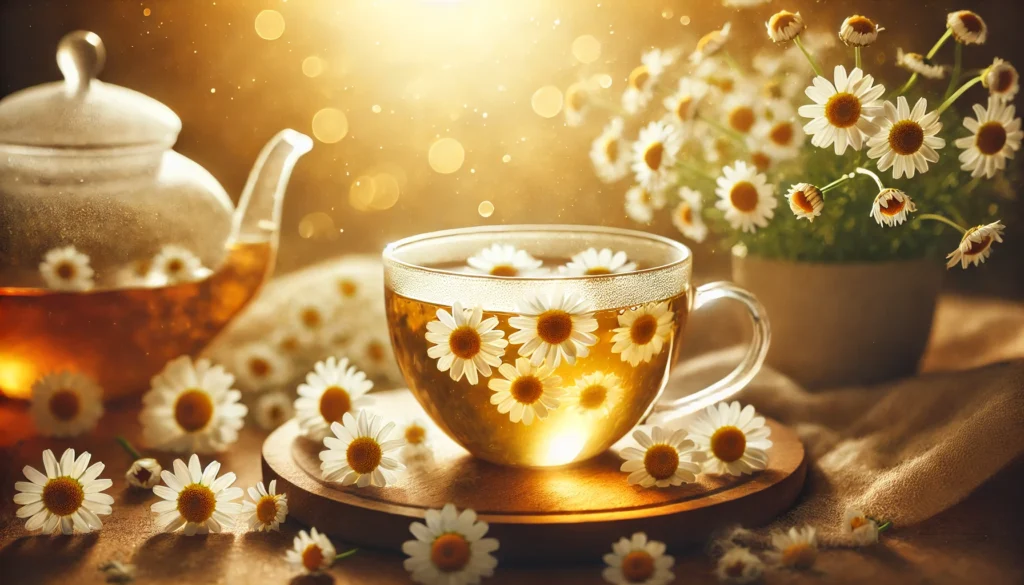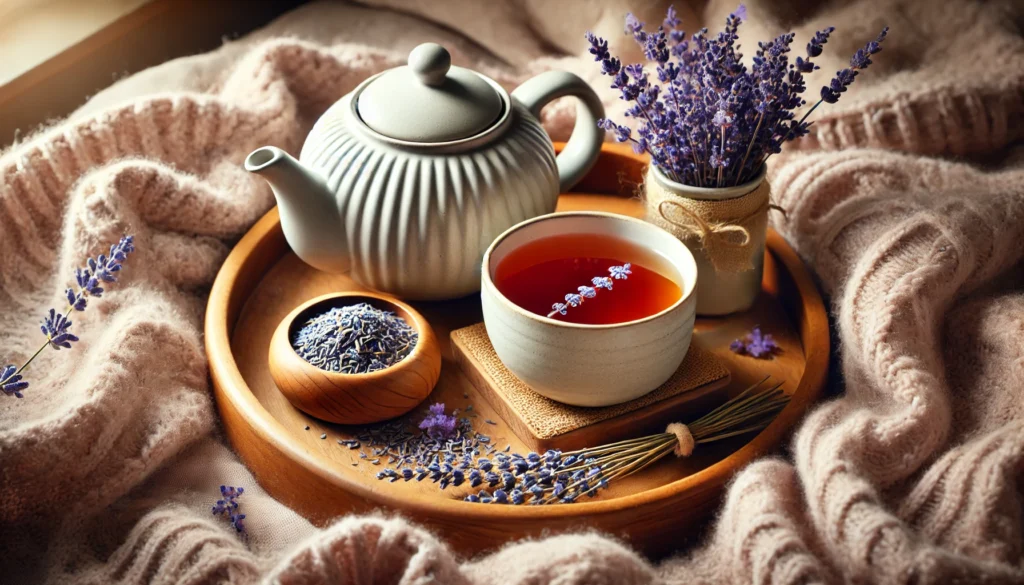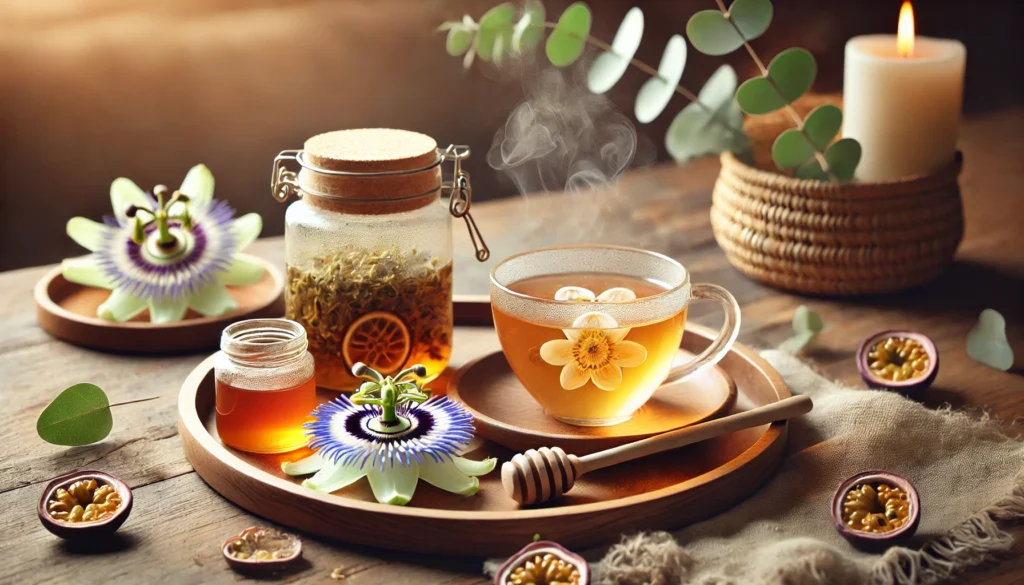Herbal teas are renowned for their calming effects, but what makes them effective in soothing anxiety? Most herbal teas contain compounds that interact with brain receptors, promoting relaxation and reducing stress hormones. Understanding the biochemical interactions between these compounds and the human body can provide insights into their effectiveness.
You may also like: Natural Supplements for Effective Anxiety Relief

Understanding the Biochemical Interactions
Herbal teas often contain bioactive compounds that engage with neurotransmitter systems in the brain. These interactions can modulate the release and uptake of neurotransmitters like serotonin, dopamine, and GABA, which are crucial in mood regulation. For instance, many herbal teas increase GABA activity, a neurotransmitter that inhibits excitability in the nervous system, contributing to a calming effect.
The Role of Antioxidants in Anxiety Reduction
In addition to neurotransmitter modulation, many herbal teas are rich in antioxidants, which help combat oxidative stress linked to anxiety. Oxidative stress can lead to inflammation and neuronal damage, exacerbating anxiety symptoms. Antioxidants in herbal teas neutralize free radicals, reducing oxidative stress and potentially alleviating anxiety.
Hormonal Balance and Stress Response
Certain herbal teas influence hormone regulation, particularly cortisol, known as the stress hormone. High cortisol levels are associated with increased anxiety and stress. Herbal teas like chamomile and lavender can help lower cortisol levels, promoting a more balanced stress response and contributing to reduced anxiety symptoms.
Chamomile: A Time-Tested Remedy
Chamomile is perhaps the most celebrated herbal tea for anxiety. Known for its mild sedative effects, chamomile is often recommended to those experiencing anxiety and insomnia. The question remains: Does chamomile help anxiety? Scientific studies suggest that chamomile contains apigenin, an antioxidant that binds to certain receptors in your brain, decreasing anxiety and promoting sleep.
The Active Compounds in Chamomile
Chamomile’s efficacy is largely attributed to apigenin, a bioflavonoid with sedative properties. Apigenin binds to benzodiazepine receptors in the brain, which are the same receptors targeted by anti-anxiety medications. This binding action helps reduce neural excitability and induces a calming effect, making chamomile an effective natural tranquilizer.
Historical Usage of Chamomile for Calming Nerves
Chamomile has a rich history, dating back to ancient Egypt and Greece, where it was used for its medicinal properties. It has long been a staple in herbal medicine, often touted as the best tea to calm nerves. Today, many individuals claim, “Chamomile tea cured my anxiety,” attesting to its enduring efficacy.
Modern Scientific Validation
Contemporary research supports chamomile’s historical use, with studies indicating significant anxiety reduction in individuals consuming chamomile tea regularly. Clinical trials have shown that chamomile can reduce generalized anxiety disorder symptoms, providing a scientific basis for its traditional use.
Lavender: More Than Just a Pleasant Aroma
Lavender tea is another popular choice for anxiety relief. Known for its soothing aroma, lavender has been used in aromatherapy to promote relaxation and sleep. Consumed as a tea, it can offer similar benefits. The compounds in lavender are believed to affect the limbic system, the part of the brain that controls emotions.
The Chemistry of Lavender’s Calming Effects
Lavender contains linalool and linalyl acetate, compounds that produce calming effects. These substances interact with the limbic system, modulating emotional responses and reducing anxiety. The limbic system’s involvement means that lavender not only calms but also uplifts mood, making it doubly beneficial.
Lavender in Aromatherapy and Tea
While lavender is often associated with aromatherapy, its use as a tea provides a more sustained calming effect. Drinking lavender tea allows for the slow release of its active compounds, maintaining a prolonged state of relaxation. This method enhances the tea’s anxiety-reducing properties over time.
Research on Lavender’s Efficacy
Scientific studies have demonstrated lavender’s effectiveness in alleviating anxiety and improving sleep quality. Clinical trials have shown that lavender can significantly reduce anxiety levels and improve overall mental well-being, making it a valuable addition to any anxiety management regimen.
Passionflower: Nature’s Tranquilizer
Passionflower is lesser-known but no less effective. Often recommended as the best tea for anxiety and depression, passionflower works by increasing levels of gamma-aminobutyric acid (GABA) in the brain, which helps reduce brain activity and induces a state of calm.
The Mechanism of Passionflower’s Action
Passionflower enhances GABA levels in the brain, a neurotransmitter responsible for reducing neuronal excitability. By boosting GABA, passionflower induces a calming effect similar to that of prescription tranquilizers, but without the associated side effects, providing a natural alternative for anxiety relief.
Passionflower’s Role in Depression Management
In addition to its anxiolytic properties, passionflower has shown promise in alleviating symptoms of depression. By modulating neurotransmitter systems, passionflower can improve mood and emotional stability, offering a dual benefit for those experiencing both anxiety and depression.
Clinical Studies on Passionflower
Clinical studies have validated passionflower’s use in managing anxiety, with participants reporting reduced anxiety levels after regular consumption. These findings support passionflower’s reputation as a potent natural tranquilizer and highlight its potential in holistic mental health care.
Lemon Balm: A Zesty Solution to Stress
Lemon balm, a member of the mint family, is recognized for its ability to improve mood and cognitive function. It has been studied for its effects on anxiety, with some findings suggesting it can significantly reduce symptoms of anxiety and depression. Lemon balm tea is a refreshing way to enjoy these benefits.
Cognitive Enhancement and Mood Improvement
Lemon balm is known for its mood-enhancing properties, which extend to cognitive benefits. The compounds in lemon balm can improve concentration and reduce cognitive fatigue, making it an excellent choice for those seeking both mental clarity and emotional calm.
Lemon Balm’s Interaction with Neurotransmitters
The active compounds in lemon balm interact with neurotransmitter systems, particularly GABA and acetylcholine. By modulating these neurotransmitters, lemon balm can reduce anxiety and enhance cognitive function, providing a comprehensive approach to mental well-being.
Research Findings on Lemon Balm
Recent studies have highlighted lemon balm’s potential in reducing anxiety and enhancing mood. Participants in clinical trials have reported significant improvements in anxiety symptoms and overall mental health, supporting lemon balm’s role as a natural remedy for stress and anxiety.

Combining Herbal Teas for Optimal Benefits
While each herbal tea has unique properties, combining them can amplify their effects. A blend of chamomile, lavender, and lemon balm, for example, may offer a comprehensive approach to managing anxiety. Experimenting with different combinations can help individuals find the best tea for their specific needs.
Crafting the Perfect Herbal Blend
Creating a personalized herbal blend allows individuals to tailor their tea to specific needs. By combining teas with complementary properties, such as chamomile’s sedative effects and lemon balm’s mood enhancement, one can achieve a balanced and effective remedy for anxiety.
Synergistic Effects of Herbal Combinations
The combination of different herbal teas can lead to synergistic effects, where the combined impact is greater than the sum of individual effects. This synergy can enhance the overall efficacy of the tea, providing a more potent anxiety-relief solution.
Tailoring Blends to Individual Preferences
Personal preferences play a crucial role in the effectiveness of herbal teas. By experimenting with different blends, individuals can discover which combinations best suit their taste and anxiety management needs, ensuring a pleasant and beneficial tea experience.
Preparing the Perfect Cup
The preparation of herbal tea is as much an art as it is a science. To maximize the benefits, it is essential to use high-quality, fresh ingredients. Steep the tea for the recommended time to ensure the extraction of beneficial compounds.
Choosing Quality Ingredients
Selecting high-quality, organic ingredients is crucial for maximizing the therapeutic benefits of herbal teas. Freshness ensures that the active compounds are potent and effective, enhancing the tea’s ability to alleviate anxiety.
Optimal Steeping Techniques
The steeping process is vital to extracting the full range of active compounds from herbal teas. Following recommended steeping times and temperatures ensures that the tea’s therapeutic properties are fully realized, providing the maximum calming effect.
Enhancing Flavor and Benefits
To enhance both flavor and therapeutic benefits, consider adding natural sweeteners or complementary herbs to your tea. Ingredients like honey or mint can not only improve taste but also contribute additional health benefits, making your herbal tea experience more enjoyable and effective.
The Role of Herbal Teas in Modern Wellness Trends
Herbal teas are not just a remedy for anxiety; they are part of a broader wellness trend that emphasizes natural and holistic approaches to health. As the wellness industry grows, the demand for herbal teas is likely to increase, driven by their perceived benefits and the desire for natural alternatives to pharmaceuticals.
The Rise of Natural Health Solutions
The growing interest in natural health solutions reflects a shift toward holistic wellness practices. Consumers increasingly seek remedies that align with sustainable and health-conscious lifestyles, making herbal teas a popular choice for those looking to manage anxiety naturally.
Herbal Teas in the Global Market
The global market for herbal teas is expanding rapidly, with increasing consumer demand for natural anxiety remedies. This trend is driven by a growing awareness of the potential side effects of pharmaceuticals and a preference for safer, more natural alternatives.
Integration into Holistic Health Practices
Herbal teas are increasingly being integrated into holistic health practices, such as yoga and meditation, to enhance their calming effects. This integration highlights the versatility of herbal teas as a complementary tool in comprehensive wellness routines.
Future Implications and Research Directions
The growing interest in herbal teas has sparked scientific research into their effects on mental health. Future studies may provide more definitive answers about the efficacy of specific teas, leading to more personalized recommendations for those seeking natural anxiety relief.
Advancements in Herbal Tea Research
As scientific interest in herbal teas grows, research is becoming more sophisticated, focusing on understanding the precise mechanisms and potential benefits. This advancement promises to deliver more targeted and effective recommendations for herbal tea use in anxiety management.
Personalized Herbal Tea Solutions
Future research may pave the way for personalized herbal tea solutions, allowing individuals to tailor their tea consumption based on genetic, lifestyle, and psychological factors. This personalization could enhance the effectiveness of herbal teas in managing anxiety and promoting overall well-being.
Collaborations Between Traditional and Modern Medicine
The convergence of traditional herbal knowledge and modern scientific research offers exciting possibilities for collaborative approaches to mental health care. Such collaborations could lead to the development of new, evidence-based treatments that combine the best of both worlds, enhancing the role of herbal teas in anxiety management.

Practical Advice for Incorporating Herbal Teas into Your Routine
For those looking to incorporate herbal teas into their daily routine, start with a single cup in the evening, when anxiety levels are typically higher. Gradually increase your intake based on your comfort and response to the tea. Keep in mind that while herbal teas can be beneficial, they should complement, not replace, other anxiety management strategies.
Establishing a Relaxing Tea Ritual
Creating a calming tea ritual can enhance the anxiety-reducing effects of herbal teas. Setting aside dedicated time each day to enjoy a cup of tea in a peaceful environment can help reinforce relaxation and mindfulness, contributing to a more effective anxiety management routine.
Monitoring and Adjusting Your Intake
It’s important to monitor your response to herbal teas and adjust your intake accordingly. Some individuals may experience significant benefits with just one cup a day, while others may find increased consumption necessary. Pay attention to how your body reacts and make adjustments to optimize benefits.
Combining Tea with Other Relaxation Techniques
For optimal anxiety management, consider combining herbal tea consumption with other relaxation techniques, such as deep breathing exercises, meditation, or yoga. These practices can enhance the calming effects of herbal teas, providing a holistic approach to reducing anxiety.
Conclusion: The Calming Cup
In conclusion, herbal teas offer a promising natural remedy for anxiety. Whether it’s the soothing properties of chamomile, the aromatic allure of lavender, or the tranquil effects of passionflower, there’s a herbal tea for everyone. While more research is needed to fully understand their potential, the anecdotal and historical evidence is compelling. So, next time you’re feeling anxious, consider reaching for a calming cup of herbal tea.
Further Reading:
Restless? Try These Bedtime Teas for Better Sleep
Herbal treatment for anxiety: Is it effective?
What are the benefits of chamomile tea?
Important Note: The information contained in this article is for general informational purposes only, and should not be construed as health or medical advice, nor is it intended to diagnose, prevent, treat, or cure any disease or health condition. Before embarking on any diet, fitness regimen, or program of nutritional supplementation, it is advisable to consult your healthcare professional in order to determine its safety and probable efficacy in terms of your individual state of health.
Regarding Nutritional Supplements Or Other Non-Prescription Health Products: If any nutritional supplements or other non-prescription health products are mentioned in the foregoing article, any claims or statements made about them have not been evaluated by the U.S. Food and Drug Administration, and such nutritional supplements or other health products are not intended to diagnose, treat, cure, or prevent any disease.


